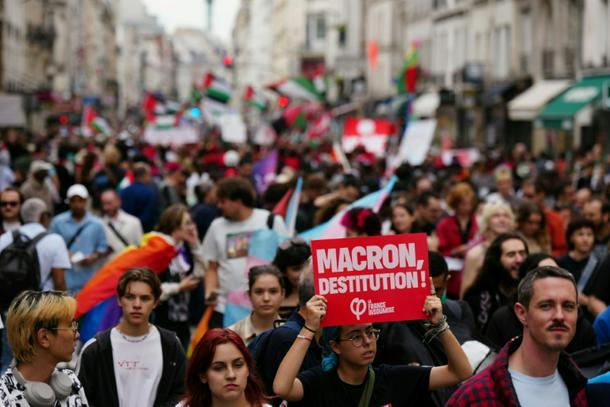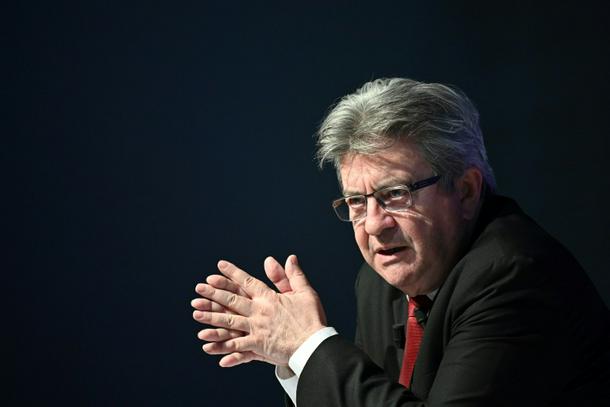
Michel Barnier's new government is already being threatened by a no-confidence vote in parliament
Paris (AFP) - French Prime Minister Michel Barnier’s hard-won new government faced instant challenges Sunday as threats of a no-confidence motion in parliament multiplied.
The head of government is also under intense pressure to fix France’s fragile financial position, saying a “national effort” was needed to do so.
The long wait for a functioning government after President Emmanuel Macron called a snap general election ended after 11 weeks late Saturday with his appointment of a cabinet marking a clear shift to the right.
Left-wing opponents said they will challenge Barnier’s government with a no-confidence motion as early as next month, with far-right politicians also slamming its composition.

Supporters of the left-wing New Popular Front argue the new government makes a mockery of the election result
In the July election, a left-wing alliance called the New Popular Front won the most parliamentary seats of any political bloc, but not enough for an overall majority.
Veteran far-right leader Marine Le Pen meanwhile saw her National Rally emerge as the single largest party in the National Assembly.
Macron had argued that the left was unable to muster enough support to form a government that would not immediately be brought down in parliament, and rejected a National Rally candidate over the party’s extremist legacy.
- ‘Greatest possible cohesion’ -
He turned instead to Barnier to lead a government drawing on parliamentary support mostly from Macron’s allies, as well as from the conservative Republicans and centrist groups.
In a TV appearance late Sunday Barnier called for “the greatest possible cohesion” within the government, and for a willingness to find “compromise”.
Far-left leader Jean-Luc Melenchon has called the new lineup “a government of the general election losers”, saying France should “get rid” of it “as soon as possible”.

Melenchon dismissed the new government as made up of 'general election losers'
Thousands of people took to the streets of Paris and other French cities Saturday in a left-wing protest to denounce what they called a denial of July’s election results.
Socialist Party chairman Olivier Faure called Barnier’s cabinet the “most right-wing government of the Fifth Republic”.
Macron had been counting on a neutral stance from the far right, but National Rally leader Jordan Bardella said the new government had “no future whatsoever”.
While Macron’s allies had to relinquish some key ministries, they still got 12 portfolios out of the total 39.
“This is not a new government, it’s a reshuffle,” quipped Communist party leader Fabien Roussel.
- ‘Painful measures’ -
Former French president Francois Hollande, a Socialist, said the new government would inflict “painful measures on our fellow citizens”.
He said a no-confidence motion was “a good solution”.

Bardella said the new government marked 'a return to Macronism' and had 'no future whatsoever'
To pass, such a motion needs an absolute majority in parliament, which would then force the government to step down immediately – currently an unlikely scenario as the far right and the leftist bloc, sworn enemies, would have to vote in unison.
Faure said the Socialists were planning to bring a no-confidence vote on October 1 after Barnier’s general policy speech to parliament scheduled for that day.
But he acknowledged that “it will probably fail” in the absence of support from the National Rally, which has said it will wait before making any move against the government.
The first major test for Barnier, best known internationally for leading the European Union’s Brexit negotiations with Britain, will be to submit a 2025 budget plan addressing France’s precarious financial situation, which he called “very serious”.
In the interview late Sunday, Barnier called for a “national effort” to cut deficits, but ruled out across-the-board tax rises.
High earners would have to “do their bit”, he said, but ruled out income tax rises for low and middle-income earners who, he said, already bore “the highest tax burden among EU partners”.
France has been placed on a formal procedure for violating European Union budgetary rules and needs to show it is making a serious effort at financial recovery.
The difficult job of submitting a budget plan to parliament next month falls to 33-year-old Antoine Armand, the new finance minister, and Budget Minister Laurent de Saint-Martin who has already said that “strong choices” would have to be made.
Among the other new faces in key cabinet posts are Foreign Minister Jean-Noel Barrot, while the interior ministry went to Bruno Retailleau of the Republicans whose right-wing credentials have created unease even in Macron’s own camp.
Defence Minister Sebastien Lecornu, a close Macron ally, has kept his job.
burs-jh/imm